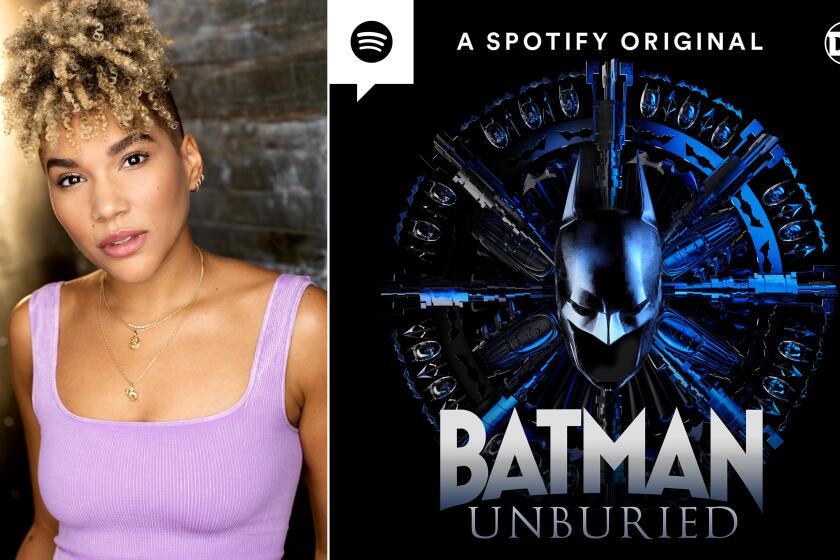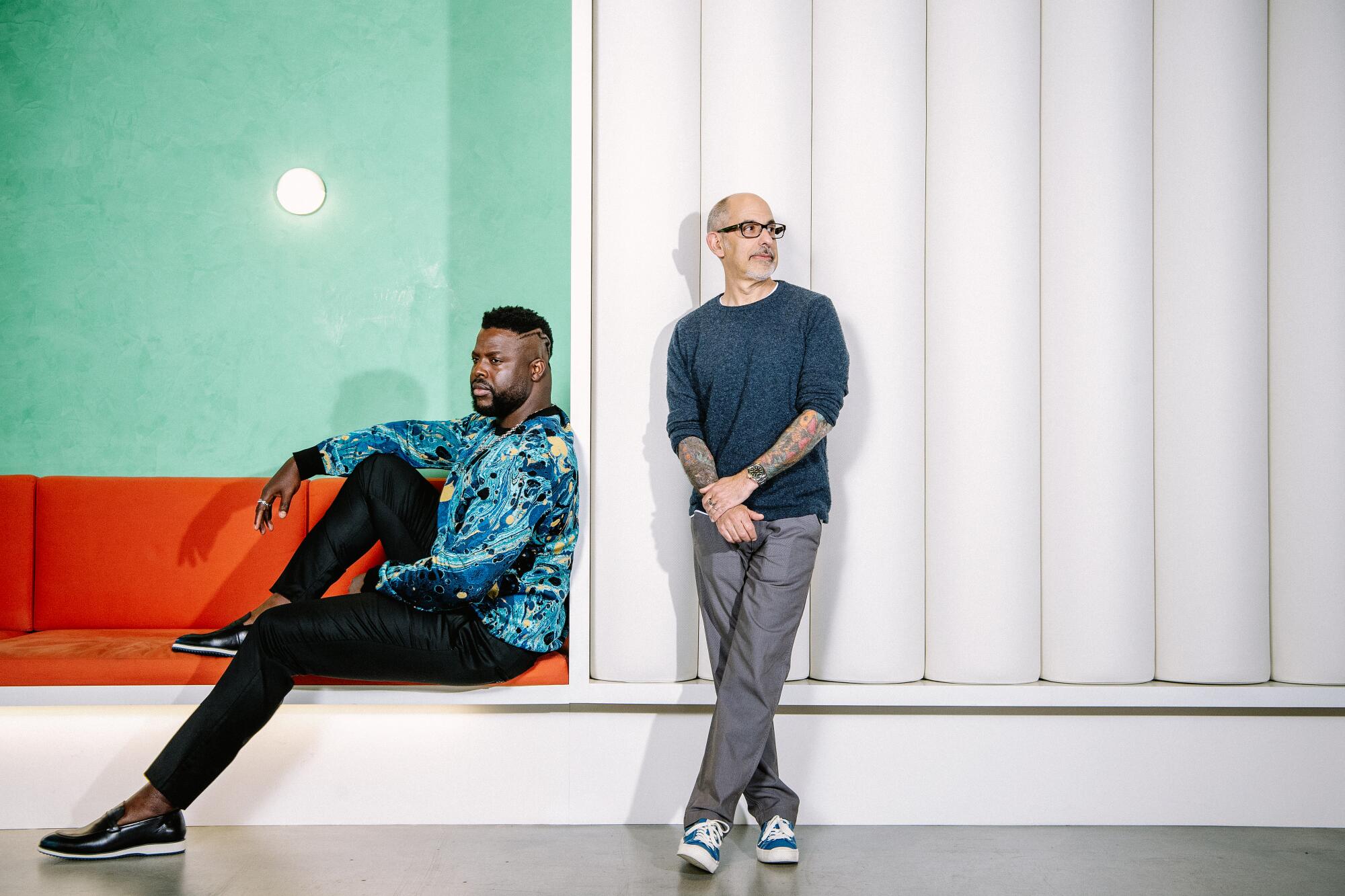
- Share via
How do you breathe new life into one of the most adapted comic book characters of all time, who already has countless iterations? Naturally, you make a podcast about him.
“Batman Unburied,” a scripted audio series created and executive produced by David S. Goyer, which stars Winston Duke (Bruce Wayne/Batman), is unlike any Batman story to come before it.
“This isn’t completely bingeable and it didn’t all drop at once, so we were very deliberately messing around with the narrative,” Goyer said. “You can get halfway into the story and actually not know who the real villain is — which has been really fun.”
Just days after its two-episode premiere on May 3, the superhero audio drama skyrocketed to No. 1 on Spotify’s U.S. podcast charts — knocking off “The Joe Rogan Experience” along the way. “Batman Unburied” has remained a fixture at or near the top of the chart as its five-week run now comes to an end.
Emmy Raver-Lampman digs into the shocking reveal on Spotify’s ‘Batman Unburied’ podcast and weighs in on tackling such a well-known villain.
Thanks in large part to its simultaneous release in nine markets worldwide — Spotify’s largest podcast launch yet — the audio series quickly became a global hit as well. Following its debut, “Batman Unburied” claimed the top spot in Mexico, India, the U.K., Australia, France, Germany, Brazil and Italy.
Goyer, a prolific screenwriter who has spearheaded a collection of comic book adaptations — “Blade,” “Batman Begins,” “Man of Steel,” etc. — was relieved to find that people are open to an all-new take on the Caped Crusader.
“What’s been so lovely about the response is that so many people have embraced it. I always felt like Batman should be for everyone,” he said. “The acceptance of it just blew me away across the board. There was no pushback at all in terms of the casting, which was invigorating and sort of made me feel just better about humanity in general. Also, just that we could tell this kind of story and that [the fanbase was] open to, a certain extent, messing with the canon.”
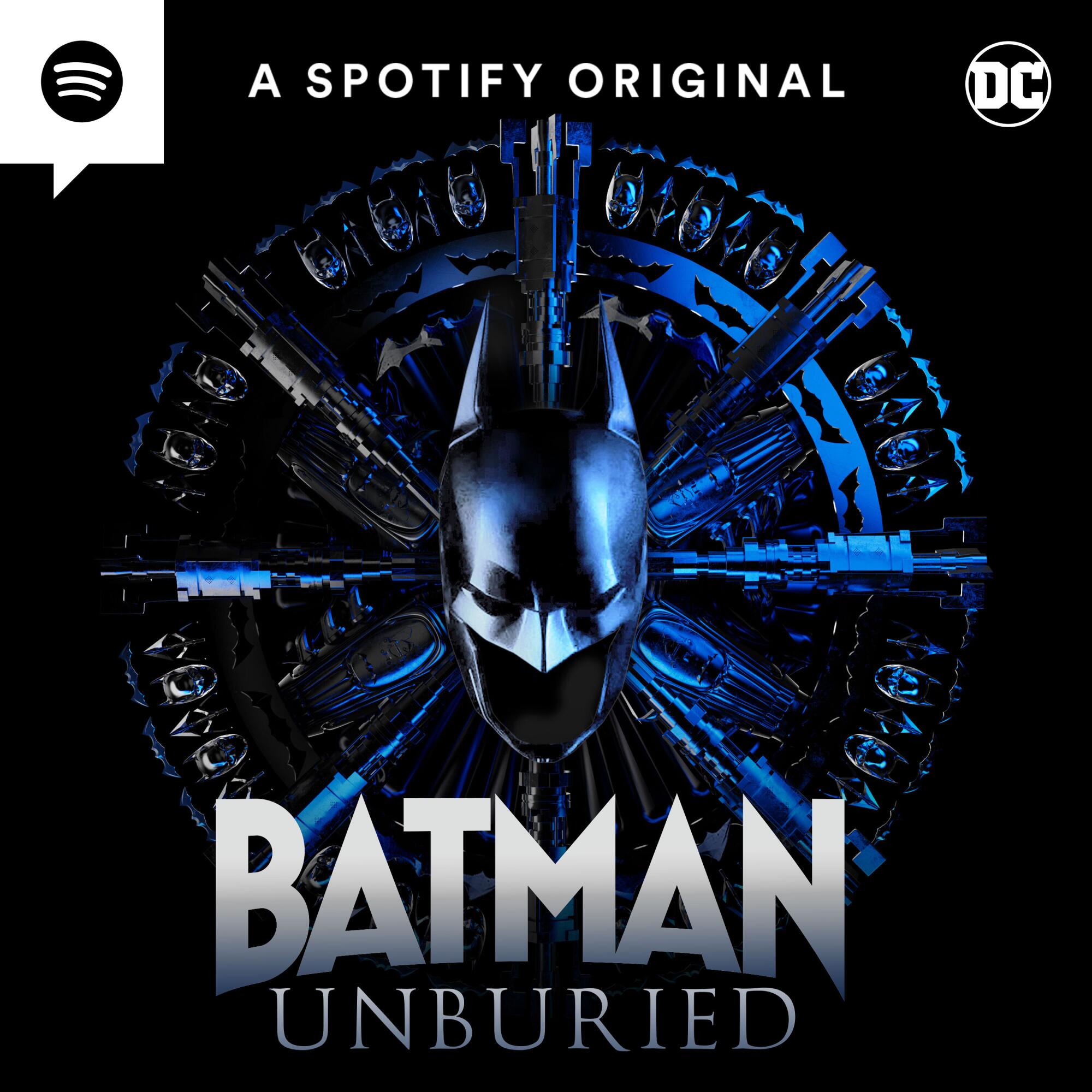
The “Batman Unburied” original story features shocking reveals, earned plot twists and dramatic cliffhangers every step of the way. It takes some big risks and experiments in ways that previous adaptations of the character haven’t — in terms of its casting, narrative and the auditory medium.
The majority of the main cast are actors of color — including Gina Rodriguez (Barbara Gordon), Hasan Minhaj (the Riddler), Lance Reddick (Thomas Wayne) and Emmy Raver-Lampman (Poison Ivy). This both intrigued and worried Duke when he was approached to play the titular role.
“The history of the comic book world is that they don’t usually like a lot of change, and they can be very resistant to things that feel like dramatic, drastic changes,” he said. “For me, I had some anxiety about, ‘Are racist feelings of keeping Batman “pure” in that way going to come up?’ None of that really surfaced. [The response] was overwhelming support, intrigue and acceptance. That was one of the things that really just warmed my soul deeply.”
The emphasis on diverse representation worked hand in hand with the larger story they wanted to tell, and Duke said he leaned on his own experience to inform his performance as Gotham’s favorite vigilante.
“What’s going to be my inlet into this character? The more I started looking at him, I started actually seeing a lot of really great corollaries that I could attach myself to,” he said. “What does it mean to completely distrust the justice system and to feel like the only way into changing it is to take it into your own hands? What would it mean to have to shoulder the burden of saving an entire society off of your blood and sweat? I said, ‘That feels like the American Black experience … this is a really cool way to make this possessed by Blackness without being didactic and preachy about it.’”
Goyer added that if “the audience feels like they’re being preached to while they’re being fed their entertainment, they can very quickly turn it off … it’s like a spoonful of sugar with your medicine. If it’s too preachy, the result completely backfires.”
Once he signed on to “Batman Unburied,” Duke set out to break barriers with his performance and show that a Black version of the Batman character can and should exist.
“I’m a Caribbean American man, and that’s coming through my voice. So when I’m thinking of how my family dynamic is as the Wayne family, that’s what I’m drawing on and that’s what you’re receiving,” he said. “You’re getting all this inherent, lived experience inside this body that is this Black experience coming through this voice. That’s how you shift these narratives into the future and through a platform where people can connect all over the world and receive it. It changes the entire game.”
“Batman Unburied” differentiates Bruce and his Bat-inspired alter ego — a dual persona that is historically intertwined — in a way that hasn’t really been done before.
In the opening episodes, the audience is introduced to a version of Bruce who is a forensic pathologist instead of a billionaire playboy. Listeners are also led to believe that his parents are still alive and because of that he was never forced to put on the cowl.
Duke, who is best known for his roles in “Us” and “Black Panther,” saw this as an opportunity to make the character more relatable than he has been in the past.
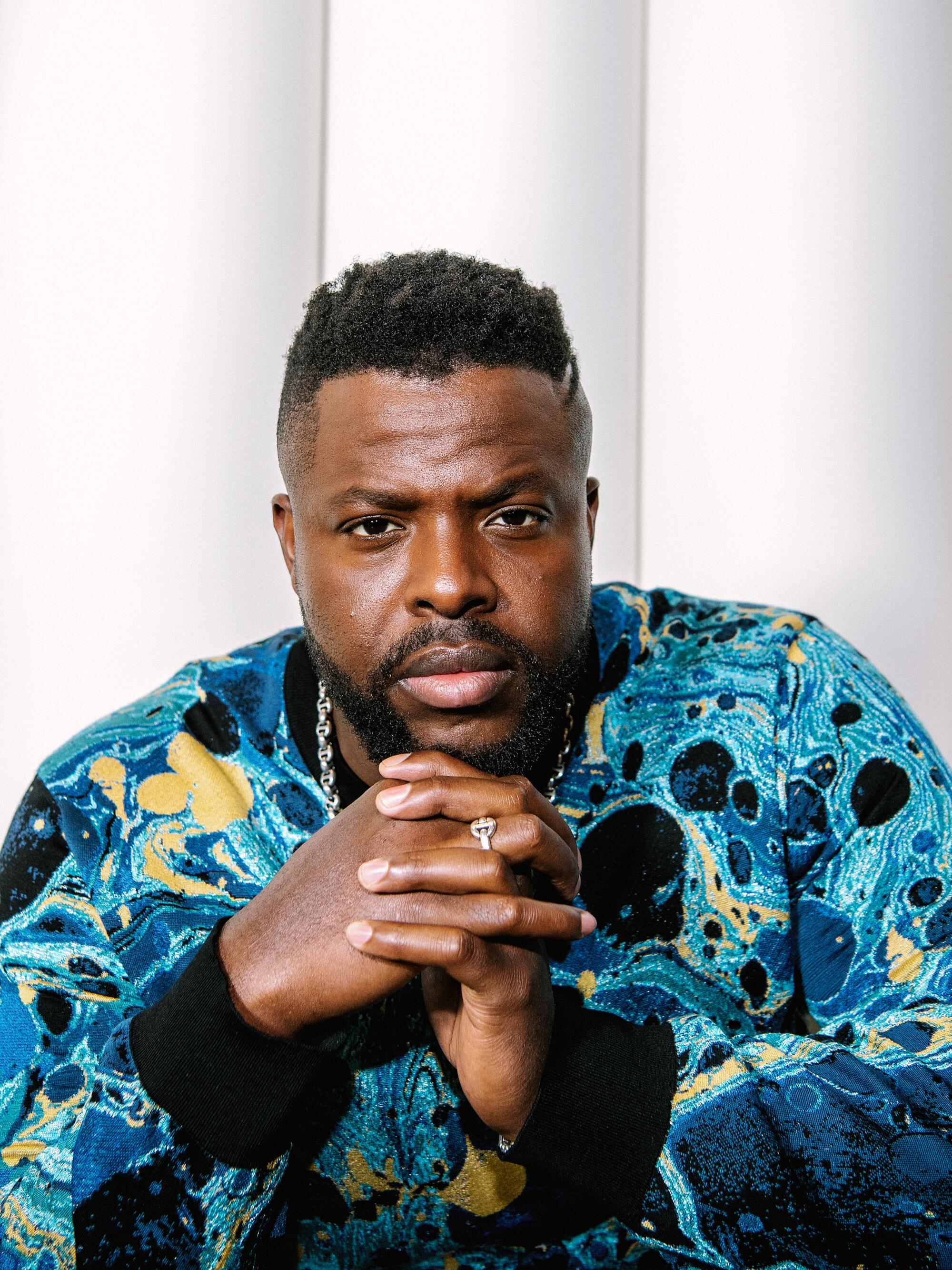
“I saw this as an opportunity to just make Bruce a very relatable guy, even if he is coming from a family of means.”
— Winston Duke
“I saw this as an opportunity to just make Bruce a very relatable guy, even if he is coming from a family of means,” he said. “This is just a guy who has an overbearing family who is really trying to figure something out and traumatic things are happening to him in real time. The classic narrative is that traumatic things have already happened to him and now he’s either stone-cold or has all built up these calluses.”
Playing the Dark Knight on the other hand? That was far more practical for the accomplished actor.
“For me, it was very utilitarian … I’ve always seen Batman as a complete theatrical performance,” he said. “He has to change his voice — Bruce Wayne, as we know him, is Elon Musk. He’s that famous, he’s that public and he’s that demonstrative of who he is. He has to be putting on some sort of show so that people can’t recognize that whoever they believe Bruce Wayne could be is out here running around beating people up at night.”
Goyer’s creation is a distinctly darker take on the cowl-wearing crimefighter. He said if it was made live-action “it would have been R-rated.”
Due to the lack of visuals, the immersive sound design shines throughout the series. “Batman Unburied” is chock-full of authentic soundscapes that sound — in the best way possible — eerie and haunting.
The metallic clank of a Batarang, the screaming blare of police sirens whooshing by, and the spine-chilling crunch of the Harvester (Sam Witwer) eating an organ from one of his many victims.
It’s also far more focused on Batman’s mental psyche rather than Batman’s physical brutality. It replaces action set pieces with mystery, suspense and horror.
That’s where Hugo Strange (John Rhys-Davies) comes in.
Spoiler warning: The remainder of this story will discuss plot twists from the “Batman Unburied” season.
“The idea of using him was in the first paragraph that I wrote up because I thought, ‘How can we not take this opportunity and put Bruce on the couch and have Hugo [Strange] try to break his will?’” Goyer said. “Let’s kidnap Bruce Wayne and just completely take him down memory lane in this horrific way and break him down and break his will. Because we’ve got to extract this information from his head. Let’s psychoanalyze him and have him literally and figuratively deal with his demons.”
After a well executed bait-and-switch halfway through “Batman Unburied,” it’s revealed that the real puppeteer pulling the strings behind both Hugo Strange and the Harvester — the initial villains — is none other than Poison Ivy.
Goyer said that since he was a kid, he always had an affinity for the secondary and tertiary members of Batman’s Rolodex of villains, which is why he ultimately went with the beguiling eco-terrorist as the main antagonist.
“I was really excited because we took a villain [Poison Ivy] that historically hasn’t been taken that seriously and part of the challenge there was, ‘What can we do with her? And can we make her f— up and scary?”
What makes Poison Ivy an increasingly complex character — aside from Raver-Lampman’s compelling performance — are her complicated motivations.
“Can we do with our Poison Ivy what in the films Chris [Christopher Nolan] did with the Joker or with Scarecrow or something like that,” Goyer said. “One of the things I’ve always tried to do in my stories is make the villains, their plans, their wants or their take on the world — no matter how scary they are — make [the audience] say, ‘Oh, some of that makes common sense; I don’t completely disagree with them.’ That’s what makes them interesting.”
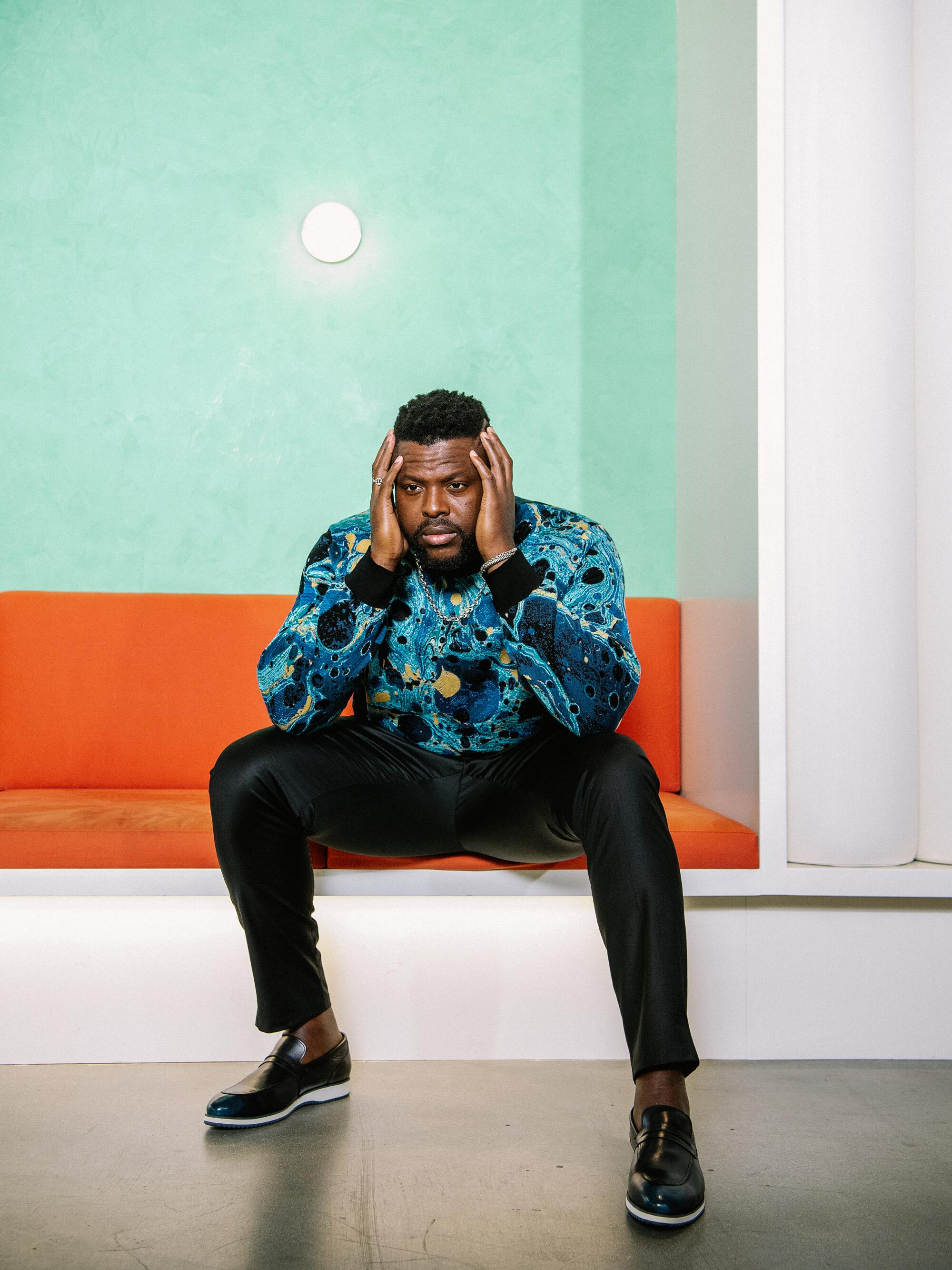
Duke loved the choice to make Poison Ivy the big bad, noting that her psychological approach to violence makes her a thrilling adversary for Bruce. She’s also uniquely relevant for the modern day.
“I would argue that she’s kind of the most current and applicable villain for today. She is a really great allegory for what we are facing right now, which is not knowing what to trust, and it, in turn, transmits to a lack of self-trust,” he said. “That’s what [Hugo Strange and Poison Ivy] are trying to do to Bruce this entire time. Break down his trust in himself and hopefully break his will through that and completely destroy what he thinks his memories are and what his idea of reality is. That’s what makes her so dangerous. Batman can take a punch; you can break his back.”
So what’s next for “Batman Unburied” and will there be a second season?
It seems likely, considering that the series is the product of a recent partnership among Spotify, Warner Bros. and DC Comics and serves as the origin for their forthcoming audio universe.
Goyer said he’s definitely willing to dive back into “Batman Unburied,” on one condition.
“[Spotify has] definitely asked if I’m interested in doing more,” Goyer said. “My response is what I said to Winston: If he’s game for more, I’m game for more, because this has been a very pleasurable experience. … Hopefully we have the ability to play in that space again.”
Which raises the question: Is the “Batman Unburied” star on board?
“I am very game for more, I can tell you that,” Duke said with a grin. “We’ve just kind of dipped our toe into that water. … If we did move forward, it’s just a really cool opportunity to really dive into that pool.”
More to Read
The biggest entertainment stories
Get our big stories about Hollywood, film, television, music, arts, culture and more right in your inbox as soon as they publish.
You may occasionally receive promotional content from the Los Angeles Times.
